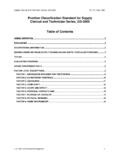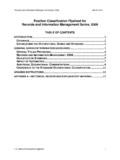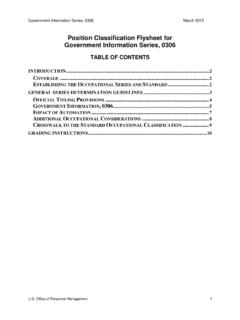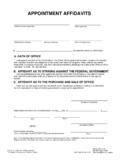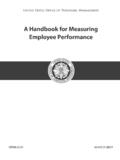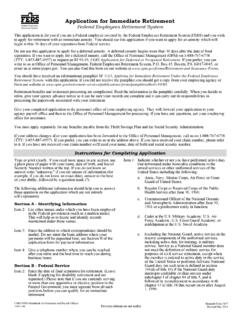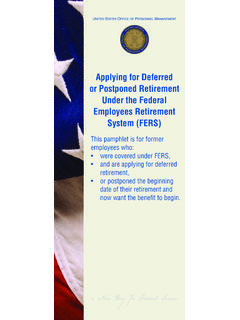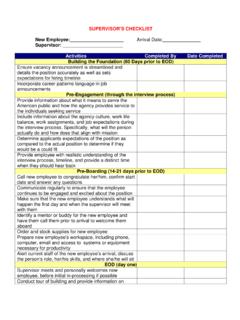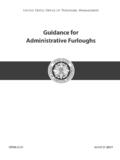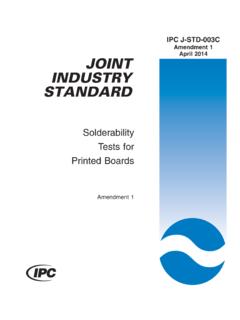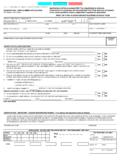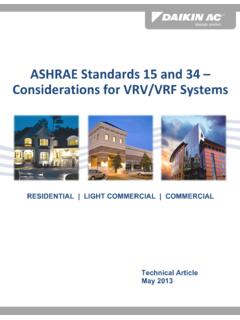Transcription of Position Classification Standard for International ...
1 International cooperation Series, GS-0136 TS-16 June 1958 Position Classification Standard for International cooperation Series, GS-0136 Table of Contents SERIES THE MUTUAL SECURITY THE PROGRAMMING WORK OF THE DESK GRADE-DISTINGUISHING International cooperation OFFICER, International cooperation OFFICER, International cooperation OFFICER, Office of Personnel Management 1 International cooperation Series, GS-0136 TS-16 June 1958 SERIES DEFINITION This series includes all classes of positions the duties of which are to advise on, administer, supervise, or perform research and operational work in the planning, development, and implementation of foreign economic assistance programs undertaken by the United States. These duties require a knowledge of economic, social, cultural, and political conditions in the country of assignment and of United States foreign policy.
2 This series includes positions which were formerly classified in the International Relations Series GS-0131. Since the GS-0131 series was not designed to cover positions requiring special knowledge and abilities in the carrying out of foreign economic assistance programs, this new series (GS-0136) has been established for such positions. The International Relations Series GS-0131 has not been superseded. The grade level descriptions in these standards discuss the work of International cooperation Officers who are assigned as desk officers and perform the full range of duties described below. (Note: This Standard was prepared in collaboration with the International cooperation Administration.) Since the nature of the qualifications required is reflected in the discussion of the responsibilities of International cooperation Officers in the grade level descriptions, no separate qualifications statements are included at each grade level.
3 All of the positions require a knowledge of the economic, social, cultural and political factors in the country of assignment, a knowledge of United States foreign policy, and the ability to meet and deal successfully with important political and diplomatic figures. THE MUTUAL SECURITY PROGRAM Under the Mutual Security Program, the United States undertakes to promote world peace and its own security by the development of economic, political, and military strength among friendly nations. The Mutual Security program is an integral part of the foreign policy of the United States; as such the formulation and coordination of broad policies for this program are a function of the State Department. The agency which administers the Mutual Security Program is responsible for implementing these policies and objectives through the formulation, development and administration of technical cooperation , and economic assistance programs.
4 These programs are undertaken on the basis of formal agreements and arrangements with the governments concerned. The agreements cover mutual commitments as to the kinds of aid and assistance to be provided by the United States, and the nature and extent of the host country's participation. The agency administering the Mutual Security Program establishes missions within the host country. These missions, which include technically trained personnel, plan and formulate the Office of Personnel Management 2 International cooperation Series, GS-0136 TS-16 June 1958 assistance program in conjunction with officials of the host country, subject to approval by headquarters, and conduct operations for the effective execution of the program. For each mission operating in a host country there is established at headquarters a desk officer Position which is the operating link between the overseas mission, the technical and operating divisions of the parent agency, other government agencies, national and International financing and service agencies, the host country embassy, etc.
5 THE PROGRAMMING PROCESS Annual guidelines are issued to each overseas mission. These include (1) guidance on such matters as the basic assumptions on world conditions, policy and objectives, on the nature, form, size, and execution of the assistance program etc., and (2) procedural instructions on format, time schedule, etc. for annual submittal of programs for each country. On the basis of these guides, a mission prepares its program proposals for the coming year. These proposals are reviewed, modified, and approved by the headquarters agency and other interested agencies. The modifications are sent back to the mission which then prepares a detailed budget submission. Program adjustments are made, as called for by the President's budget, new developments, changes in policy etc., and the Congressional presentation document is prepared. The economic assistance programs are developed to accomplish specific objectives of the United States and of the free world which are based upon an analysis of their interests in the country involved.
6 The program development process starts with the identification and precise statement of United States and free world country objectives; then the problems which must be solved in order to attain those objectives are defined and analyzed; and, finally, programs are developed to solve these problems and thereby to make possible the attainment of such objectives. The total program, however, must also go beyond this point; the aid level proposed must take into account other country-wide factors; such as the aggregate demand for resources of these and other activities in relation to the resources from all sources which, it is anticipated, will be available to the country. Other factors taken into consideration in planning aid programs are: limited resources, political considerations, ability of the host country eventually to take over and operate the facilities and institutions to be created, etc.
7 Office of Personnel Management 3 International cooperation Series, GS-0136 TS-16 June 1958 WORK OF THE DESK OFFICER The desk officer (who is referred to in the grade level distinctions as International cooperation Officer) serves as the operating contact point between the overseas mission and the headquarters agency, and, through the headquarters agency, with all other interested United States foreign and International technical and finance agencies, and foundations. Utilizing the technical services available to him, he is the focal point through which all of these resources are brought to bear upon his country of assignment. At the same time he is the means through which the plans, objectives, and problems of the mission are made known to the headquarters agency. The desk officer participates in the development of the basic policies and guides which are furnished to the mission for developing its project proposals.
8 He reviews and analyzes the mission proposals and formulates and recommends programs and projects that encompass the total mutual security program for the country. This requires examination of the total country program from the point of view of (1) its applicability to critical sectors of the country's economy, (2) program balance, (3) ability of the United States to provide effective assistance in the particular country, (4) absorptive capacity of the country's economy, and (5) the accuracy and reasonableness of cost estimates. He collaborates with all other interested Government agencies at each major step in the program process to make certain that the country program will be consistent with United States foreign policy objectives. He may participate in the negotiation of agreements for the conduct of programs in the country. He recommends approval of the proposals submitted by the mission as revised and is responsible for justifying them to other segments of the headquarters agency.
9 In all of the activities described above, he works closely with the United States Operations Mission in the country. The desk officer is responsible for the continuing review and evaluation of the country programs in relation to their effectiveness in (1) supporting United States and free world policies and objectives and (2) in meeting the needs and requirements of the country. He accomplishes this through review of progress reports, statistical data, and material emanating from the mission or from other sources within the country, through discussion with mission personnel called in for consultation in Washington, and through official trips to the mission for purposes of consultation, inspection and review. He provides advice and assistance to the mission director in problems of internal mission management, staffing, and operations, and assures that the mission is receiving adequate management support from the appropriate headquarters offices.
10 The desk officer also reviews and evaluates reports of special program reviews conducted by Congressional groups, agency evaluation teams, the General Accounting Office etc., drafts responses, and recommends and follows up on appropriate corrective action to strengthen operations or staffing, change program emphasis, etc. Office of Personnel Management 4 International cooperation Series, GS-0136 TS-16 June 1958 GRADE-DISTINGUISHING ELEMENTS The difficulty of the assignments of desk officers is influenced by 1. The characteristics of the country's program for economic development, 2. The political, economic, or military importance of the country, and 3. The internal political situation of the country. These elements and the ways in which they affect the difficulty of the desk officer's Position are described below. 1. THE CHARACTERISTICS OF THE COUNTRY'S PROGRAM FOR ECONOMIC DEVELOPMENT In practically all the countries receiving U.
